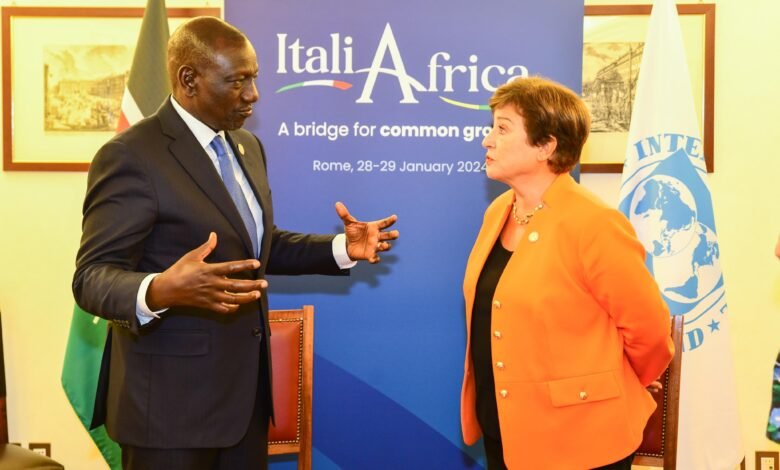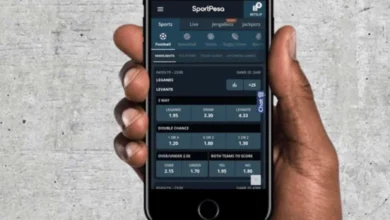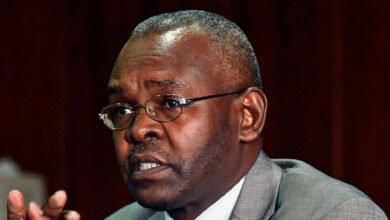
Kenya is exploring the option of tapping the international capital markets to help fund the repayment of a $2 billion eurobond that matures in June, President William Ruto said on Tuesday.
Speaking on the sideline of the Italy-Africa Summit in Rome, Ruto said the government plans to buy back part of the debt and refinance the rest through a new bond issuance.
“We are looking at various options, including going back to the market to raise some resources to retire part of the debt and also refinance part of it,” Ruto said, adding that the final decision will depend on the market conditions and the advice of the financial advisers.
Kenya’s debut eurobond, issued in 2014, consists of two tranches: a 10-year paper of $2 billion and a five-year paper of $750 million. The five-year tranche was repaid in 2019 using the proceeds of another $2.1 billion eurobond floated in the same year.
The 10-year tranche, which carries a coupon rate of 6.875 percent, is due for repayment on June 24, 2024. According to the latest data from the National Treasury, Kenya has paid $127.1 million in interest.
Kenya’s plan to return to the capital markets is marred by challenging macroeconomic environment and a rising debt burden that have raised concerns over the country’s debt sustainability.
Kenya’s public debt stood at $76.3 billion as of December 2023, equivalent to 72.5 percent of the gross domestic product (GDP), up from 62.4 percent in 2019.
About 51 percent of the debt is external, of which 38 percent is commercial.
The International Monetary Fund (IMF) and the World Bank have warned that Kenya is at a high risk of debt distress and urged the government to implement fiscal consolidation measures to reduce the budget deficit and the debt-to-GDP ratio.
The government has also faced difficulties in accessing concessional loans from multilateral and bilateral lenders due to the tight global liquidity and the increased borrowing needs of many countries affected by the pandemic.
In this context, Kenya’s access to the international capital markets has also been constrained by the high borrowing costs and the low investor appetite for emerging market debt.
According to Bloomberg, Kenya’s 10-year eurobond yield rose to 9.8 percent on Tuesday, up from 6.3 percent a year ago, reflecting the increased risk premium demanded by the investors.
Kenya’s credit rating has also been downgraded by several rating agencies in the past year, citing the deteriorating fiscal metrics and the rising debt vulnerabilities.
Fitch Ratings has already lowered Kenya’s long-term foreign currency issuer default rating to ‘B’ from ‘B+’, with a negative outlook. Moody’s Investors Service also cut Kenya’s rating to ‘B2’ from ‘B1’, also with a negative outlook.
However, Ruto expressed confidence that Kenya will be able to secure favorable terms for its planned debt sale, citing the country’s strong economic fundamentals and the ongoing reforms under the IMF program.
He said Kenya’s economy is projected to grow by 6.1 percent in 2024, up from 4.5 percent in 2023, driven by the recovery of key sectors such as agriculture, tourism, manufacturing, and construction.
He also said the government is committed to implementing the fiscal and structural reforms agreed with the IMF under the $2.4 billion financing package approved in April 2023.
The reforms include enhancing revenue mobilization, rationalizing public expenditure, strengthening public debt management, improving governance and transparency, and addressing the vulnerabilities in the state-owned enterprises.
Ruto said the government has already made significant progress in implementing the reforms and expects to receive the third disbursement of $410 million from the IMF in March, after completing the second review of the program.
Kenya is in talks with other development partners, such as the World Bank, the African Development Bank (AfDB), and the European Union (EU), to secure additional concessional financing to support its budget and development agenda.
Ruto said Kenya’s debt sale would follow the successful bond issuance by Ivory Coast earlier this month, which raised a record $8 billion from the international market.
Ivory Coast, which has a similar credit rating as Kenya, offered $2.6 billion in bonds with maturities of 12, 31, and 51 years, and received bids worth more than $23 billion, indicating a strong demand for African debt.
Ruto said Kenya would seek to replicate Ivory Coast’s experience and attract investors looking for higher returns in the low-interest rate environment.
“We are optimistic that we will be able to get a good deal from the market. We have seen that there is appetite for African debt, especially for countries that have sound economic policies and prospects,” Ruto said.





